Provision Categories in Upmind
Upmind offers 8 provisioning categories
Provisioning in Upmind can be done through several categories. Each provision category represents a specific type of service or product that can be sold and managed through Upmind, with specialised functions and integrations to handle the unique requirements of that service.
Below, we provide a detailed breakdown of its core categories, including how they work, key features, and real-world applications:
Web hosting
This category covers provisioning for shared web hosting accounts across popular platforms, making setup quick and hassle-free. Web hosting eliminates manual server configuration, reduces downtime, and ensures reliable performance.
The system handles creating hosting accounts, retrieving account details, monitoring disk space and bandwidth, managing login URLs, updating passwords or packages, suspending or terminating accounts, and managing reseller privileges.
Example: When a customer buys a shared hosting plan, Upmind automatically sends a request to your cPanel server to create the account with the chosen domain, and the customer gets their login details within seconds.
Supported providers:
- cPanel
- Plesk
- 20i Hosting
- Enhance
- InterWorx
- SolidCP
- DirectAdmin
- CentosWeb
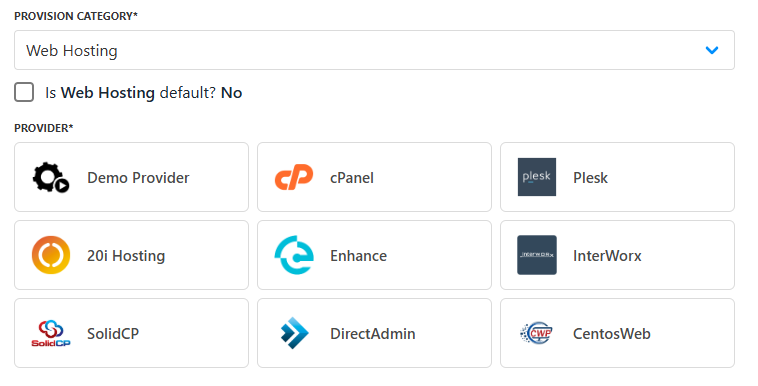
Web hosting provision providers
Domain names
This category automates domain name tasks like registration, renewal, transfer, and overall management across various registries and reseller platforms. This prevents domain expiration and reduces manual DNS errors.
The system handles registering, renewing, and transferring domains, updating DNS settings, and retrieving domain information.
Example: When a user buys "mycompany.com" from your website, Upmind uses your registrar credentials to register the domain and applies the default nameservers automatically.
Supported providers:
- HexonetNominet
- Enom
- OpenSRS
- HRS
- ResellerClub
- LogicBoxes
- NetEarthOne
- ConnectReseller
- Resell.biz
- OpenProvider
- NameSilo
- CoCCA EPP
- NIRA
- RICTA
- UG Registry
- Domain Name Api
- Namecheap
- CentralNic
- CentralNic Reseller
- GoDaddy
- Realtime Register
- InternetBS
- EuroDNS
- InternetX
- EURID
- TPP Wholesale
- Synergy Wholesale
- Netim
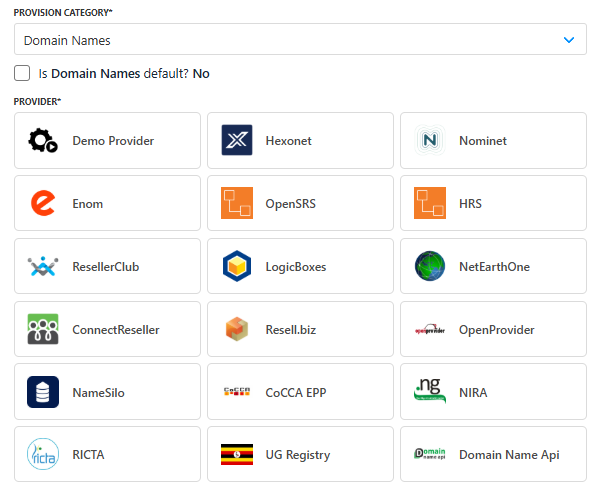
Domain name provision providers
Auto login
This category makes it easy for users to log in to their online service accounts directly, enhancing their experience with convenient access links. It reduces the need for password reset support tickets and improves security.
The system handles creating accounts, generating secure login URLs, suspending or unsuspending accounts, updating packages, renewing, and terminating accounts.
Example: After setting up a hosting account, a customer can click Login to cPanel from the Upmind portal and access their dashboard without needing to log in again.
Supported providers:
- SpamExperts

Auto login provision providers
SEO
Although not detailed in the search results, SEO provisioning usually means automating the setup and management of SEO services like analytics, reporting, and optimisation tools. This helps make websites search-ready without any manual plugin or configuration work.
Example: When a customer signs up for an SEO audit plan, Upmind automatically sets up access to a third-party audit tool and sends the login details to the customer.
Supported providers:
- marketgoo

SEO provision providers
Website builders
This category handles provisioning for website builder platforms and related tools, letting customers launch polished websites in minutes instead of days.
It takes care of creating site builder accounts, retrieving account details and usage, generating auto-login links, updating packages, and managing account suspensions or terminations.
Example: When a customer buys a WordPress hosting plan, Upmind automatically sets up the hosting, installs WordPress, and preloads their chosen theme, making the whole process smooth and fast.
Supported providers:
- BaseKit
- Website.com
- Weebly
- Topline Yola
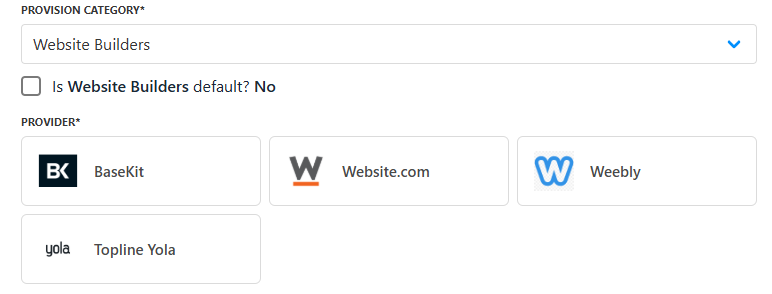
Website builder provision providers
Software licenses
This category automates the setup and management of software licenses, helping prevent overbuying and unused licenses.
It handles creating license keys, tracking usage, upgrading or downgrading licenses, reissuing keys, and managing suspensions or terminations.
Example: When a customer buys a CloudLinux license, Upmind automatically provisions it through the API and instantly delivers the license key to the customer.
Supported providers:
- EnhanceBlesta
- WHMCS
- cPanel
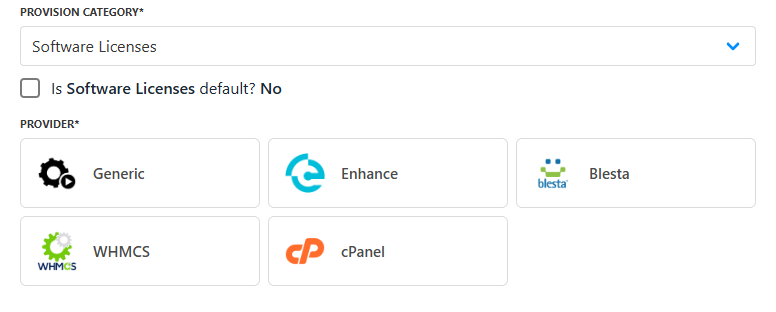
Software license provision providers
Servers
This category automates server provisioning on popular cloud platforms, delivering high-performance servers without needing system administrator skills.
It handles creating, managing, and terminating server instances, retrieving server details, and managing configurations.
Example: When a customer orders a VPS, Upmind sets up the server on your Virtualizor instance, assigns an IP address, and emails the root login details to the customer.
Supported providers:
- LinodeSolusVM v1
- Virtualizor
- Virtuozzo Hybrid Server 7
- OnApp
- Virtfusion
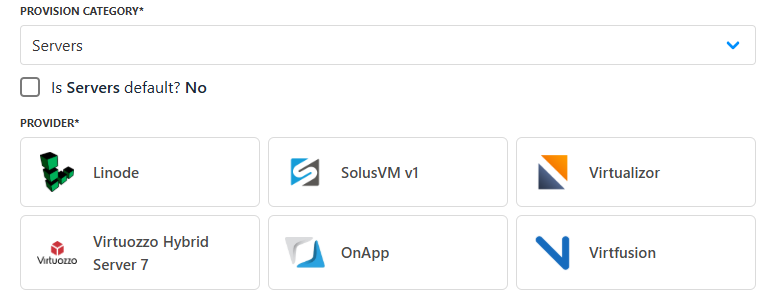
Server provision providers
Office tools
This category automates the setup and management of business productivity tools like email.
Example: When a client buys Titan Email, Upmind instantly creates inboxes, sets security rules, and syncs accounts automatically. This saves time, reduces errors, and lets teams focus on work.
Supported providers:
- Titan Email

Office tool provision providers
Provision category fields
Provision category fields in Upmind are the essential customisable settings and parameters you configure to automate the delivery and management of services.
These fields typically include the provider type, API credentials, product or package mapping, resource limits, and automation rules for actions like activation, suspension, or termination.
You can also set up domain names, user credentials, and advanced options such as reseller privileges or custom scripts. Each provisioning request is fully logged, giving you transparency and a complete audit trail.
Updated 7 months ago